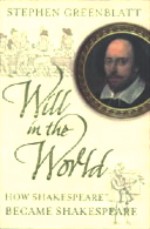|
Book
Review
How Shakespeare Became Shakespeare
Gary
Taylor
 Why
would anyone buy yet another biography of Shakespeare? Why
would publishers pay a million-dollar advance to its author?
He has not discovered a single new document written by or
about Shakespeare. He does not present any new evidence that
would alter the scholarly consensus about which texts Shakespeare
wrote, when he wrote them, or what his contemporaries thought
of them. Why
would anyone buy yet another biography of Shakespeare? Why
would publishers pay a million-dollar advance to its author?
He has not discovered a single new document written by or
about Shakespeare. He does not present any new evidence that
would alter the scholarly consensus about which texts Shakespeare
wrote, when he wrote them, or what his contemporaries thought
of them.
Nevertheless,
Stephen Greenblatt's Will in the World has been greeted, in
America, as an epochal achievement: lengthily and reverently
reviewed in the New Yorker, excerpted in the New York Times
Magazine, extravagantly praised by critics, poets, actors.
Simon Russell Beale calls it "a love letter" to
Shakespeare.
It
deserves such praise and I hope it outsells Harold Bloom's
pompous Invention of the Human. But love letters are not known
for their objectivity. Love letters construct a shared fantasy.
"Let us imagine," Greenblatt begins, promising that
if we "use our own imagination" we will understand
Shakespeare's. "Let us imagine," for instance, a
personal meeting between the soon-to-be-martyred Edmund Campion
and a soon-to-be-famous young man from Stratford. Did Shakespeare
meet Campion? Did Shakespeare witness the royal entertainment
at Kenilworth in 1575 and did they inspire A Midsummer Night's
Dream? Was his father an alcoholic, and was that wasted, loveable
father the inspiration for Falstaff? Did Shakespeare leave
Stratford because he was caught poaching? What matters, Greenblatt
answers, is "not the degree of evidence but rather the
imaginative life that the incident has". What matters
is not the true story but a good story.
Greenblatt
has been the world's most influential Shakespearean for a
quarter of a century because he tells good stories. The alliterative
title "Will in the World" is classic Greenblatt:
using Shakespeare's pun on his own first name, it turns the
forbidding author into an approachable "Will", while
simultaneously insisting on the profound relationship between
individual desire and "the crushing, glacial weight of
the everyday".
Will
in the World tells a better story than other Shakespeare biographies.
"A young man from a small provincial town - a man without
independent wealth, without powerful family connections and
without a university education - moves to London in the late
1580s and, in a remarkably short time, becomes the greatest
playwright not of his age alone but of all time." Like
most good stories, this tale of rags to aesthetic riches is
a variation on a familiar favourite, the "poor lad, hard
work, get rich" myth canonised by Horatio Alger and innumerable
American politicians.
At
times that stale older tale comes uncomfortably close to the
surface: Greenblatt briefly imagines "Shakespeare as
the patron saint of parking lot attendants", getting
his start in the big city holding horses for rich folks. But
he quickly dismisses that image. For most people who write
and read biographies of Shakespeare, the narrative of his
business dealings "is not a terrible story, but it is
not uplifting either. It is merely and disagreeably ordinary."
Greenblatt
instead wants to write, and most consumers of literary biography
want to read, a story extraordinary and uplifting. The first
sentence of his preface promises "the greatest [story]
of all time", and he keeps that promise. Every chapter
plops dollops of hyperbole on Our Hero. Greenblatt repeatedly
celebrates Shakespeare's Houdini ability "to assume all
positions and to slip free of all constraints". He seems
not to notice that his repeated "all" is contradicted
by his own compelling argument, elsewhere in the book, that
Shakespeare did not understand happy marriages or saints.
But (as Shakespeare's plays show) when we're in the grip of
a good story, we don't notice little inconsistencies like
that.
That's
not an uplifting story. It would be more generous (more Shakespearian?)
to say that Greenblatt has mined his own life to supply the
emotional raw materials that energise this book. Like Shakespeare,
Greenblatt writes convincingly of the "complex states
of estrangement" in a bad marriage, "as if the misery
of the neglected or abandoned spouse was something he knew
personally and all too well". Like the author of the
sonnets (and me), Greenblatt knows about "the erotic
virtue of mendacity", how "the age difference"
between two lovers can be "a paradoxical source of excitement",
and why "The woman who most intensely appealed to Shakespeare
in his life was 20 years younger than he". At his best,
Greenblatt understands Shakespeare so well because he understands
himself. We should all be so wise.
This article was first published in The Guardian
Copyright
(R) thedailystar.net 2004
| 